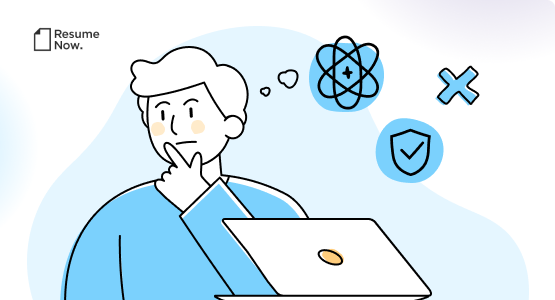Table of contents
No matter the industry or career path, everyone begins somewhere. Often, seeking an entry-level role can be intimidating. It can be tough to feel confident when you’ve never done something before. But armed with a strong job application including a great entry-level resume and cover letter, you’ll be ready to take on the challenges of an entry-level role.
Writing a great cover letter may seem daunting, especially when you don’t have extensive experience to talk about, but it’s an important step that can be simpler than you think. With the help of our guide, and inspiration from some of our entry-level cover letter examples, we’ll take some of the guesswork out of the cover letter writing process, so you can focus on pursuing your goals and moving your career forward.
In this guide we cover:
- The features of a great entry-level cover letter.
- An entry-level cover letter template that you can cut, paste and customize to your needs.
- How to write an entry-level cover letter for different scenarios and career stages.
- Tons of resources for crafting an attention-getting job application.
Ready to build your cover letter now? Use our Cover Letter Generator. Our builder takes care of formatting your cover letter and even offers auto-generated text suggestions to craft a standout entry-level cover letter in a matter of minutes.
Popular entry-level cover letter examples
How to write an entry-level cover letter
Step 1
Select an appropriate cover letter template
Choose a cover letter template that is in line with the organization to which you’re applying. An entry-level data entry clerk will probably benefit from a simple no-frills template, but an entry-level tour guide for a children’s museum would probably benefit from a cover letter template that expresses more personality. Make sure that whatever you choose is a good fit for the role and doesn’t provide any over-the-top distractions.
Step 2
Add your contact information to the header
The cover letter header can be at the top left, top right or in the top center of the page, depending on which template you choose. It should include the following information:
- Your name
- City and state
- Phone number
- Email address
- Links to your LinkedIn profile or professional website, if you have one
Step 3
Greet the hiring manager
Do your best to find the name of the hiring manager to personalize your letter. Then use a professional salutation, such as “Dear Ms. Jones.” If you can’t find a name, address your letter to “Dear Hiring Manager.” Avoid greetings like “To Whom It May Concern,” since these can sound cold.
Step 4
Write a brief but impactful opening paragraph
Introduce yourself in the first paragraph, adding compelling details and data and metrics about your education and career to entice the recipient to keep reading.
Step 5
Craft detailed body paragraphs
Aim for writing three short paragraphs that are packed with detail to show potential employers that you’re qualified for the position. Mention your most impressive work experience and offer details about the impact your work has had on the organizations you’ve worked for. Focus on using action words to make the language of your letter more interesting, and include keywords from the job ad to tailor it to the role.
Step 6
Emphasize your skills
No matter the industry, all entry-level applicants should emphasize soft skills like enthusiasm, attention to detail, resourcefulness and flexibility. These skills will transfer to any role and are always helpful in the work place. Alongside your soft skills, list some hard skills, like subject matter expertise or proficiency with relevant software. Try to strike a balance between hard skills vs soft skills, adding a mix of both throughout your letter.
Step 7
Write your cover letter closing
Your cover letter closing is where you wrap up your letter by reiterating your interest, thanking the hiring manager for their time and inviting them to contact you.
Step 8
End with a professional signoff
End your letter with a polite and professional signoff, such as “Sincerely,” “Thank you” or “Respectfully.” Then, on the next line, sign your name.
resumes made with Resume Now!
Entry-level cover letter examples by career stage
As your career progresses and changes, so will the contents of your cover letter. Below, we have provided examples of how to write an entry-level cover letter for every stage of your career.
New graduate entry-level cover letter
Why this entry-level cover letter works:
-
Professional template
A professional template with the right balance of simplicity and visual appeal gives this cover letter a polished and modern feel.
-
Appropriate tone
A cover letter needs to be confident but humble. It should never read as pushy or aggressive. This cover letter is worded politely but includes many assertive statements that highlight the candidate’s value.
-
Focuses on goals
As a recent graduate, this candidate doesn’t have the wealth of experience that a seasoned pro might have. Instead, focusing on career progression and goals allows her to show off her enthusiasm and willingness to learn.
Cover letter for a first job
Why this entry-level cover letter works:
-
Simple layout
A first job is no time to get flashy with formatting. A simple cover letter that sticks to the basics and nails the typical formatting rules is the safest bet for a first-timer.
-
Addresses the hiring manager by name
Addressing the hiring manager by name is a good call because it shows initiative and proves you’ve looked into the role.
-
Detailed body paragraphs
Body paragraphs that dig into the details of the candidate’s experience are a great way that your cover letter can deepen the career story told on your resume.
Career change cover letter
Why this entry-level cover letter works:
-
Professional style
This cover letter is traditional and classic with a professional template that underscores the candidate’s previous journalistic experience.
-
Addresses the career transition
One of the important jobs of a cover letter is to explain big career changes. Since this candidate is applying for a new role outside of his previous experience, explaining this change in his cover letter is wise.
-
Respectful signature
A cover letter is a formal business document first and foremost. When you sign it, you should choose a signature that matches the professional tone of the letter. This candidate’s choice of signing off with “Sincerely” is a safe bet.
Entry-level management cover letter
Why this entry-level cover letter works:
-
Prominent header
A cover letter is intended to get you a call back. So, it’s smart to display your contact information as clearly and visibly as possible. This candidate’s prominent header is a solid choice.
-
Includes numerical data
It’s one thing to talk about how you’re a great employee and it’s another thing to highlight measurable results. As an aspiring manager, this candidate displays that she understands both the scope and impact of her work and is capable of producing concrete results.
-
Call to action
A cover letter should end with a polite call to action reminding the hiring manager that you’re interested in discussing the role further. This cover letter does just that and reiterates the candidate’s contact information for good measure.
Add a matching resume
Want to make a great impression on recruiters? Add a matching entry-level resume.
Every job application for an entry-level role will require a resume. Why not create one that matches your cover letter? Having your cover letter and resume match makes your application look cohesive and well thought out. For an entry-level professional, where attention to detail is critical, this could help propel you forward in the hiring process.
If you already know how to write a resume, get started by studying our library of resume examples for inspiration. Written by professional resume writers, these examples show you exactly what a persuasive resume should look like.
To craft an entry-level resume quickly, try our professional AI Resume Builder, which offers auto-generated text suggestions for every section of your resume. You’ll have a well-written, perfectly formatted resume on the resume template of your choice finished and ready to go in a matter of minutes.
Key takeaways for your entry-level cover letter
-
Study entry-level cover letter examples
Take some time to review our entry-level cover letter examples. Use them as a guide when writing your own cover letter or take content directly from the examples and customize it to your needs. Written by professional career experts, these examples show you exactly how a strong entry-level cover letter should look and sound.
-
Keep your introductory paragraph brief
While this section of your letter should be compelling, it shouldn’t be more than a few sentences long. Make the reader want to continue reading, but save the nitty gritty details for later in the letter.
-
Write detailed body paragraphs
This section is where you should match specifics from your background to the requirements outlined in the job description. If you have special skills or gaps in your employment history, this is also the place to briefly explain them.
-
Add a matching resume
You can’t apply for a job without a resume. So, why not make it look great? When you create your resume, consider using a resume template that matches or compliments the look and feel of your cover letter.
Resources to help prepare for your interview
Was this information about Entry-level Cover Letter Examples, Templates & Writing Tips helpful? Let us know!
Hailey Brophy is an experienced writer with a diverse career in digital publication. She is passionate about using her unique skills and experiences to help job seekers find the information that they need to succeed.
More resources

11 High-Paying Jobs That Are Less Stressful AND Flexible
Leave your stress behind with a high-paying low-stress work-fr...

AI Compliance Crisis: 57% Concerned About Unclear AI Policies at Work
Resume Now examines growing concerns amongst workers regarding...
![How to Write Education Section on a Resume in 2025 [+ Examples] How to Write Education Section on a Resume in 2025 [+ Examples]](/sapp/uploads/2021/11/how-to-write-the-education-section-of-a-resume.jpg)
How to Write Education Section on a Resume in 2025 [+ Examples]
As seen in 1Foot Note Table of contents Create your resumeGet ...

Director of Operations Resume: Examples, Templates & Tips for 2025
Ready to explore an exciting new role as a director of operati...

Professional Tutor Cover Letter Sample & Writing Guide
A standout cover letter for a tutoring job should showcase you...

Free School Guidance Counselor Cover Letter Templates
Showcase your passion for guiding your students in a compellin...
